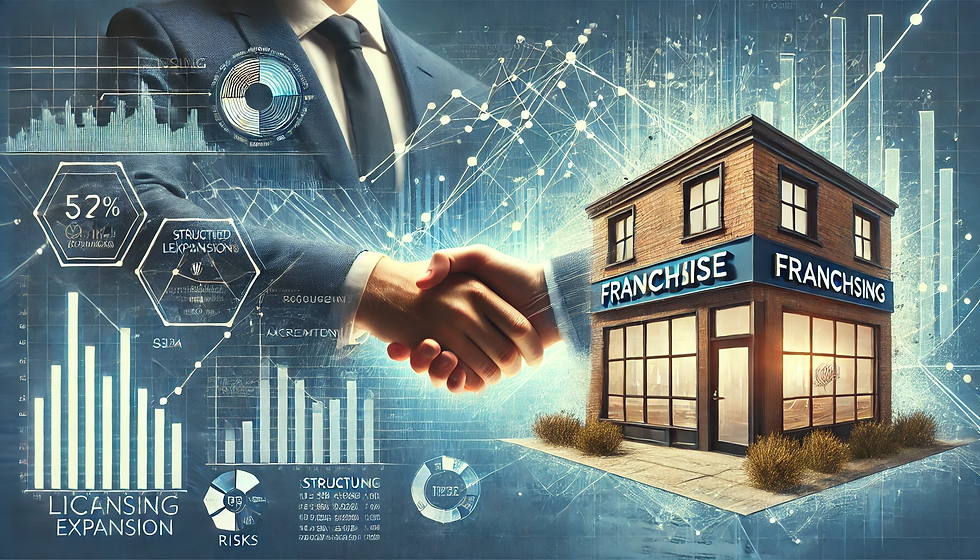
Business expansion is exhilarating. The idea of seeing your brand, product, or service reach new markets—sometimes across borders—is what every entrepreneur dreams of. But when it comes to scaling, two models dominate: licensing and franchising. Both are powerful, both can generate enormous revenue, but both also carry risks—some obvious, some hidden beneath layers of legal agreements, market dynamics, and operational challenges.
So, which one carries more risk? Which model can lead to success, and which one could spell disaster if not handled correctly?
If you're an entrepreneur, investor, or brand owner trying to scale your business, you need to understand the real licensing vs franchising risks. We’re not talking about vague textbook explanations—we're diving deep into real-world case studies, documented failures, market statistics, and authentic research to uncover the truth behind these business models.
By the end of this, you’ll never look at licensing and franchising the same way again.
Understanding Licensing and Franchising at Their Core
To understand risk, you must first understand the core mechanics of each business model.
Licensing: A Shortcut to Market Expansion?
Licensing is a contractual agreement where a brand (licensor) grants rights to another party (licensee) to use its trademark, technology, intellectual property, or brand name in exchange for royalties or fees.
Examples of licensing:
Disney licensing its characters to toy manufacturers
Microsoft licensing its software to PC manufacturers
Starbucks licensing its brand to coffee distributors in supermarkets
Licensing is quick, flexible, and low-maintenance compared to franchising. But does that mean it is risk-free?
Franchising: The Highly Structured Expansion Model
Franchising is a business model where the franchisor gives the franchisee the right to operate a business under its brand with strict guidelines on operations, marketing, and business processes.
Examples of franchising:
McDonald’s, which operates over 41,000 franchises globally
Subway, with more than 36,000 franchise locations worldwide
KFC, which expanded internationally through aggressive franchising
Franchising is highly structured, but with structure comes control—and risk.
Risk Analysis: Licensing vs. Franchising
Financial Risks: Where Are You More Likely to Lose Money?
Licensing risks:
Unstable royalties if licensees underperform
Market misalignment if a licensee fails to maintain brand reputation
Lack of control over how the licensee operates
Example: Nokia’s Licensing MistakeWhen Nokia licensed its brand to HMD Global to produce smartphones, initial sales soared. But the brand struggled to differentiate itself in a competitive market, leading to declining revenues. Licensing alone could not save the business from market saturation and brand dilution.
Franchising risks:
High initial investment to develop training programs, legal documentation, and ongoing support
Operational risk if a franchisee mismanages their unit, damaging the entire brand’s reputation
Legal battles that lead to costly lawsuits
Example: Quiznos’ Franchising CollapseQuiznos, once a booming sandwich chain, expanded aggressively through franchising but failed to support its franchisees. Many went bankrupt, resulting in lawsuits and financial disaster.
Brand Reputation Risks: What Can Destroy a Business Faster?
Licensing risks:
A licensee’s poor-quality product can tarnish the original brand
Negative publicity is hard to control once it spreads
Example: Ferrari’s Licensing FiascoFerrari licensed its brand for various products, including cheap perfumes and electronics. This over-licensing diluted the luxury image of Ferrari, leading the company to cut down on licensing deals.
Franchising risks:
A single bad franchise can create brand-wide scandals
Franchising lawsuits damage credibility
Example: Subway’s Franchise ScandalsSubway faced multiple legal issues involving franchisee complaints, food quality control, and franchisee bankruptcies, leading to widespread media backlash.
Legal Risks: Which Business Model Faces More Lawsuits?
Licensing risks:
Intellectual property theft when licensees copy designs or technology without paying royalties
Contract disputes when licensees refuse to pay royalties, leading to long legal battles
Example: Apple vs. Qualcomm Licensing WarApple and Qualcomm were locked in a billion-dollar licensing dispute, accusing each other of violating terms. Licensing agreements are notoriously difficult to enforce.
Franchising risks:
Franchisee vs. franchisor lawsuits over royalties, contracts, and mismanagement
Government regulations that add legal hurdles
Example: 7-Eleven’s Franchise Lawsuits7-Eleven faced multiple franchisee lawsuits for unfair policies, leading to a damaged reputation and financial losses.
Which Model Carries More Risk? The Verdict
Licensing is riskier when it comes to brand control, intellectual property theft, and contract enforcement.Franchising is riskier in financial investment, legal disputes, and brand reputation management.
If you prioritize speed and flexibility, licensing is the better choice, but it comes with the risk of brand dilution.If you want long-term brand control, franchising offers stability but comes with operational and financial risks.
How to Mitigate Risk in Both Models
For licensing:
Work with reliable, well-vetted licensees
Limit over-licensing to maintain exclusivity
Draft strong contracts to prevent intellectual property theft
For franchising:
Provide strong support systems for franchisees
Implement strict franchisee selection criteria
Maintain consistent brand quality across all locations
Conclusion: Which Business Model Should You Choose?
Both licensing and franchising have real, documented risks that can make or break a business. There is no one-size-fits-all solution.
If you have a strong brand but lack operational infrastructure, licensing is safer.If you want maximum control over brand reputation and expansion, franchising is the way forward.
Before making a decision, analyze your risk tolerance, business goals, and financial capabilities. The wrong move can cost millions, while the right strategy can lead to global success.
What is your choice? Are you willing to take the risk?
Comments